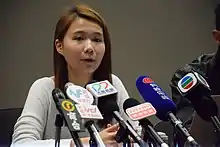Glacier Kwong
Glacier Kwong (Chinese: 鄺頌晴, Glacier Chung Ching Kwong; c. 1996) is a political activist from Hong Kong. She is founder of the non-governmental organization (NGO) Keyboard Frontline, monitoring privacy abuses and censorship on the Web.[1][2]
Glacier Kwong | |
|---|---|
 | |
| Born | 1996 (age 24–25) |
| Education | Hong Kong University |
| Occupation | advocating freedom and rights on the Web |
Biography
Glacier Kwong, being a student in the Hong Kong University, attended "Umbrella Revolution", non-violence protest that struck Hong Kong during two months of the autumn of 2014. Her family, parents and sister, knew she was attending the protest, and didn't restricted her from the demonstrations, but when British Parliament asked her for interview about the protests, parents didn't give her passport for the travel because they said "it's very political".
Glacier Kwong recorded a short video during the Umbrella Revolution about needed international assistance for Hong Kong and uploaded to the social media, where the video clip gathered over a millions views.[3]
Glacier Kwong also supported the movement Youngspiration, that was created after the end of the Umbrella Revolution to fight for seats in Legislation Council's elections.[2][4]
Keyboard Frontline
Glacier Kwong, founder of the NGO Keyboard Frontline, where she advocated for Human rights on the Web. Her interests included personal securities, for example, she said in an interview in 2019, that radio frequency identification (RFID) scanners can trace different personal devices like mobile phone or credit card, so your privacy may be abused by illegal observers.[5]
Trip for international support of Hong Kong pro-democracy movement
Glacier Kwong accompanied Joshua Wong in his foreign travel to find support for Hong Kong pro-democracy movement as well as explain causes of massive demonstrations in Hong Kong in 2019. She said in a press conference in Berlin that she asked German and European Union governments to stop supplying police equipment to Hong Kong because all have to observe human rights.[6][7]
Publications
- 'Too terrified to travel': A new normal for Hong Kong's 'Occupy Generation? Special to CNN; February 26, 2015[2]
References
- 湯惠芸 (March 4, 2016). "香港網絡23條不獲通過". Voice of America; Cantonese (in Chinese). Retrieved September 11, 2019.
- Kwong, Glacier (February 26, 2015). "Too terrified to travel': A new normal for Hong Kong's 'Occupy Generation'?". CNN. Retrieved September 11, 2019.
- Lee, Francis L. F. (May 16, 2018). "Lokman Tsui, The coming colonization of Hong Kong cyberspace, government responses to the use of new technologies by the umbrella movement". Media, Mobilization and the Umbrella Movement. Routledge. ISBN 9781315405889.
- By Leon Siciliano, and AP (September 29, 2014). "Hong Kong protester makes plea: 'world, please help us'". The Telegraph. Retrieved September 11, 2019.
- Chiu, Karen; Lew, Linda (June 13, 2019). "From Facebook and Twitter to Telegram, WhatsApp and Signal: how protest technology has evolved since Occupy Central". South China Morning Post. Retrieved September 11, 2019.
- ""Es geht nicht nur um uns"". Süddeutsche Zeitung (in German). September 9, 2019. Retrieved September 12, 2019.
- "Maas schießt gegen China zurück". BILD (in German). September 12, 2019. Retrieved September 12, 2019.
External links
- YouTube video of Glacier Kwong interview for CNN on October 3, 2014 towards the Web and Hong Kong Umbrella Revolution, Hong Kong protest driven by technology
- YouTube video of Glacier Kwong and Joshua Wong at the Bundespressekonferenz (Federal [German] Press Conference) on September 11, 2019, being interviewed on the 2019 protests in Hong Kong.